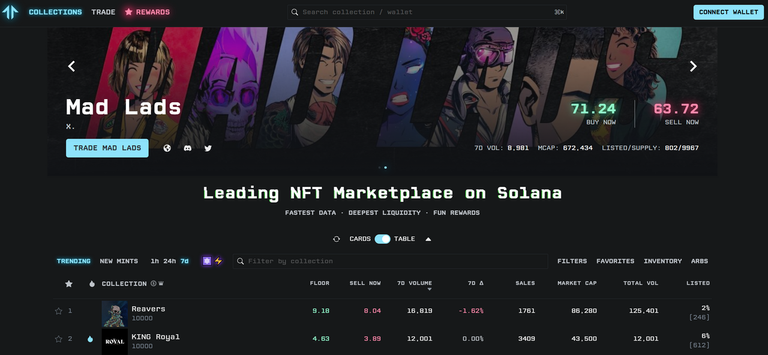
Tensor.trade is a Solana-based NFT decentralized marketplace that launched in March 2023. It was founded by Adam King, a software engineer and entrepreneur who has worked on several blockchain projects.
Tensor.trade is designed to be a more efficient and user-friendly NFT marketplace than existing platforms. It uses Solana's high-speed and low-cost transaction processing to provide users with a fast and affordable way to buy, sell, and trade NFTs.
Tensor.trade also offers a number of unique features, including:
- Decentralized governance: Tensor.trade is governed by a DAO (decentralized autonomous organization). This means that the platform is owned and operated by its users.
- Royalty-free secondary sales: Tensor.trade does not charge any royalties on secondary sales. This means that creators can sell their NFTs on the platform without having to pay a commission.
- Scalability and Speed: Solana's blockchain is designed for high throughput, allowing for quicker and cheaper transactions. Tensor.Trade leverages these advantages to create a seamless NFT trading experience.
- Interoperability: The Solana ecosystem is becoming more interoperable, allowing NFT creators to build applications that interact with DeFi, lending more utility to NFTs.
- Low Transaction Costs: The low gas fees on Solana make it more accessible for both creators and collectors, particularly during periods of high congestion on Ethereum.
- Community-Driven: Like many Solana projects, Tensor.Trade benefits from a strong community that actively contributes to its growth.
Tensor.trade has seen significant growth in recent months, despite the current crypto weak season.
In March 2023, the platform processed over $1 million in NFT trading volume. In April 2023, the platform raised $3 million in a seed round led by Place Ventures.
Strengths
Tensor.trade has a number of strengths.
- Solana blockchain: Tensor.trade is built on the Solana blockchain, which is known for its high speed and low transaction fees. This makes Tensor.trade a more efficient and affordable NFT marketplace than existing platforms.
- Decentralized governance: Tensor.trade is governed by a DAO (decentralized autonomous organization). This means that the platform is owned and operated by its users.
- Royalty-free secondary sales: Tensor.trade does not charge any royalties on secondary sales. This means that creators can sell their NFTs on the platform without having to pay a commission.
- Community Support: A dedicated community drives Tensor.Trade's growth, contributing to its continued success.
Weakness
However, Tensor.trade also has some weaknesses.
- New platform: Tensor.trade is a new platform, and it does not have the same level of liquidity or brand awareness as existing NFT marketplaces.
- Competition: While Solana is making strides, Ethereum remains the dominant NFT ecosystem with a vast array of marketplaces, projects, and artists.
Competing with ETH NFTs and the Future:
Tensor.Trade and other Solana-based NFT projects are on the path to competing with Ethereum NFTs. To succeed, they must focus on the following:
- User Experience: Ensuring a seamless user experience is critical for attracting artists and collectors to Solana-based platforms.
- Artistic Community Engagement: Collaboration with artists and creators is key to building a vibrant NFT ecosystem on Solana.
- Cross-Chain Compatibility: Building bridges to Ethereum and other blockchains can enhance interoperability and attract artists from different ecosystems.
- NFT Futures: The introduction of NFT futures trading on Solana can add depth to the NFT market and attract more traders and speculators.
Tensor.Trade represents a significant step forward in Solana's NFT journey. The Solana blockchain's advantages in speed, scalability, and cost-efficiency position it as a strong competitor in the NFT space. While challenges exist, the future looks promising, especially if Solana-based NFT projects continue to innovate and collaborate with the broader NFT community. As Solana's NFT ecosystem evolves, it has the potential to stand shoulder to shoulder with Ethereum and shape the future of digital collectibles.